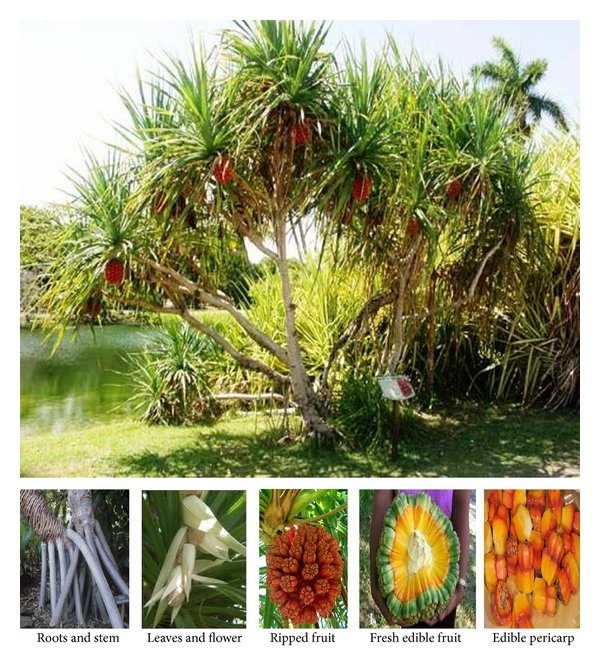Welcome to your holistic living

Botanical Name: Pandanus odorifer
Family: Pandanaceae
English Name: Screw pine, Palau Fruit, Screw Pine, Pandanus Tectorius or Pandanus Odoratissimus.
Malayalam Name: Kaithal,Pokaitha
Hindi Name: Kevada, Kewda, Kewra, Kevra
It is a small branched, palm – like tree growing to a height of 3 – 4 m, with a flexuous trunk supported by brace roots. The trunk of the tree is twisted, having a shoot-like appearance touching the ground. The leaves grow in clusters at the branch tips, 40 – 70 cm in length with rosettes of sword – shaped, stiff (leather – like) and spiny bluish – green, fragrant leaves. The tree bears very fragrant white colored flowers in clusters, used as perfume. The fruits are oval to round in shape 4 – 6 inches in diameter. The tree is found all over India in the temperate climate.It is a Some suggest that it was introduced into Yemen from India where its flowers are used chiefly to make perfume.
Root, Flower
Skin Disorders Ayurvedic Perspective: Ketak is used for treating skin ailments like itching, rashes, and eczema due to its Kandughna (anti-itch) and Vranashodhana (wound-cleaning) properties. Scientific Validation: Its anti-inflammatory and antimicrobial compounds, such as flavonoids and alkaloids, help soothe irritated skin and reduce bacterial infections. b) Digestive Disorders Ayurvedic Perspective: Ketak is beneficial for managing indigestion, flatulence, and abdominal pain due to its Deepana (appetizer) and Pachana (digestive) properties. Scientific Validation: Studies reveal that Pandanus odorifer contains bioactive compounds that stimulate the secretion of digestive enzymes, aiding in digestion and reducing bloating. c) Respiratory Disorders Ayurvedic Perspective: The plant is used to manage cough, cold, and bronchitis because of its Kaphahara (mucus-reducing) action. Scientific Validation: Ketak contains anti-inflammatory and bronchodilatory compounds that improve airflow and reduce mucus production. d) Reproductive Health Ayurvedic Perspective: Ketak is used for its Shukra Vardhaka (semen-enhancing) and aphrodisiac properties. It is also helpful in regulating menstrual disorders. Scientific Validation: Pandanus extract improves hormonal balance and acts as a natural aphrodisiac due to its antioxidant properties. e) Urinary Disorders Ayurvedic Perspective: It alleviates burning sensations and difficulty in urination due to its Mutrala (diuretic) effect. Scientific Validation: Studies show that Ketak promotes diuresis, flushing out toxins and reducing inflammation in the urinary tract. f) Nervous System Disorders Ayurvedic Perspective: Ketak is used as a calming agent for treating insomnia, anxiety, and stress due to its Tridosha-balancing properties. Scientific Validation: The plant contains compounds with sedative effects, which help improve sleep quality and reduce stress. g) Wound Healing Ayurvedic Perspective: Ketak accelerates wound healing due to its Ropana (healing) and antimicrobial properties. Scientific Validation: The antimicrobial action of Ketak helps prevent infections, while its anti-inflammatory properties promote faster tissue repair. 2) Names of Ayurvedic Medications Where Ketak (Pandanus odorifer) Is Used as an Ingredient and Other Indications of Each Medicine a) Ketakyadi Tailam Indications: Used for managing scalp conditions like dandruff, hair fall, and dryness. Other Uses: Promotes hair growth and strengthens the hair follicles. b) Gandharvadi Tailam Indications: Effective in treating joint pain, swelling, and stiffness. Other Uses: Acts as a massage oil to improve blood circulation. c) Ketakyadi Rasayana Indications: Enhances vitality and stamina, supporting reproductive health. Other Uses: Improves immunity and delays aging. d) Chandanadi Vati Indications: Alleviates burning sensations in the urinary tract and regulates Pitta disorders. Other Uses: Provides cooling effects and soothes the digestive tract. 3) Relevance of Ketak (Pandanus odorifer) in Ayurveda Towards Normalizing Dosha Behavior
Anti- inflammatory action
Rasa: Tikta, Madhura, Katu
Guna: Laghu, Snigdha
Virya: Usna
Vipaka: Katu
Dosha Karma: Kaphapitta shamaka